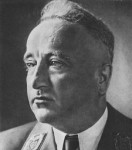
Robert Ley was a high ranking Nazi leader who oversaw the regime’s labour program. Ley was born in Niederbreitenbach in 1890, the son of a farmer with 11 children. Academically gifted, he studied at several universities and obtained a doctorate in biological and nutritional chemistry, graduating in 1920. Ley put his studies on hold to join the German army during World War I, serving as a reconnaissance officer and spending time as a prisoner of war. After the war Ley worked for the German chemical giant IG Farben; he was eventually sacked for repeated drunkenness. Alarmed by Germany’s weakened state and drawn to Adolf Hitler, Ley joined the National Socialist party (NSDAP) in 1924. The following year he was appointed Gauleiter for his native Rhineland. He also edited a Cologne newspaper, the West German Observer, which was known for publishing anti-Semitic stories and gossip.
Ley was a noted heavy drinker and prone to erratic behaviour, drunken rants and crackpot theories. He also showed a ruthless streak, whipping up street brawls and using his newspaper to blackmail Jewish businessmen. Despite his instability (or perhaps because of it) Ley continued to rise through the ranks of government and party. He became a deputy to the Prussian parliament in 1928 and a member of the Reichstag two years later. He was also put in charge of ‘staff organisation’ within the NSDAP, a role that gave him considerable influence. Ley was very unpopular with other high ranking Nazis, who considered him a coarse and incompetent drunk, however, he remained close enough to Hitler to retain his position.
Ley is best known for organising and managing Germany’s workforce during the Nazi era. In May 1933 the Nazis arrested union leaders and banned all unions; Ley was given the task of integrating these unions into a single, state-run workers’ union: the Deutsche Arbeitsfront (DAF). Under Ley’s guidance, the DAF created new labour laws and generated a new workplace culture, where workers were “soldiers for the economy”. Hiring and firing, wages and working hours were all tightly controlled by the DAF. These restrictions were offset by some improvements to workplace conditions and the provision of cheap subsidised holidays. Under Ley, DAF members grew to more than 25 million, though his personal contribution to the growth of the DAF is questionable. What is more certain is that heading the DAF made Ley very rich. Corruption was rife in the Deutsche Arbeitsfront and Ley and his acolytes lined their pockets with DAF funds, drawn from the membership dues of German workers. Ley was also fond of lecturing workers on temperance and sobriety when he was himself drunk on an almost daily basis.
Ley remained in Hitler’s inner circle during World War II. In 1941 he was put in charge of maintaining housing, a difficult role given the increasing amount of Allied bombing of German cities. Ley remained in Berlin with Hitler until April 1945 when he fled to southern Germany. American soldiers found him dressed in pyjamas, hiding in a private home and claiming to be someone else. Along with other high ranking Nazis, Ley was charged with war crimes and sent for trial at Nuremberg. He committed suicide by hanging before the trials began.
1. Robert Ley was a trained chemist and World War I veteran. He became a follower of Hitler, joined the NSDAP and quickly rose through the ranks of the party.
2. Ley was a heavy drinker who was known for his drunken rants, erratic behaviour and nasty streak. In his early days with the NSDAP, he provoked street brawls and edited a newspaper known for its anti-Semitic content.
3. Ley is best known for heading the German Labour Front (DAF), the Nazi-run workers’ union formed in mid-1933. Under his command the DAF changed workplace culture, fixed wages, reduced workers’ rights and grew to more than 25 million members.
4. Ley and his inner circle also profited heavily from the DAF, drawing on funds collected from workers’ membership dues. He also urged workers against drinking, despite his own problems with alcoholism.
5. Ley remained faithful to Hitler until the end of World War II. He was later found in hiding in southern Germany but committed suicide before he could be brought to trial for war crimes.
© Alpha History 2018. Content on this page may not be republished or distributed without permission. For more information please refer to our Terms of Use.
This page was written by Jennifer Llewellyn, Jim Southey and Steve Thompson. To reference this page, use the following citation:
J. Llewellyn et al, “Robert Ley”, Alpha History, accessed [today’s date], https://alphahistory.com/nazigermany/robert-ley/.

